沪教牛津版六年级英语上册全册知识点点汇总
沪教牛津版六年级英语上册全册知识点点汇总
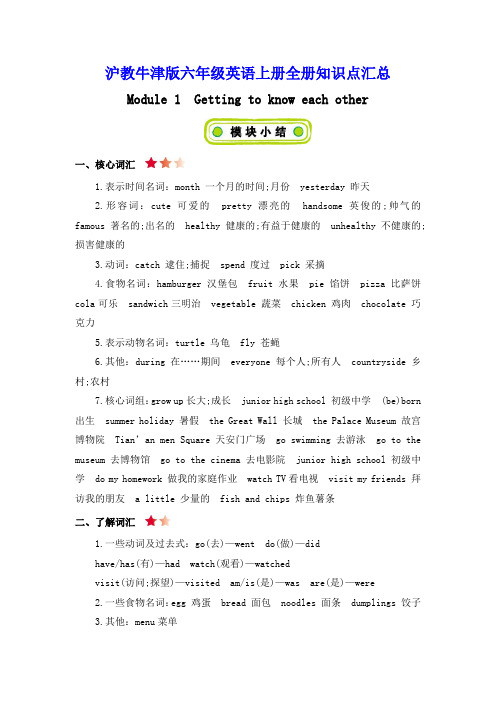
沪教牛津版六年级英语上册全册知识点汇总Module 1 Getting to know each other一、核心词汇1.表示时间名词:month 一个月的时间;月份yesterday 昨天2.形容词:cute 可爱的pretty 漂亮的handsome 英俊的;帅气的famous 著名的;出名的healthy 健康的;有益于健康的unhealthy 不健康的;损害健康的3.动词:catch 逮住;捕捉spend 度过pick 采摘4.食物名词:hamburger 汉堡包fruit 水果pie 馅饼pizza 比萨饼cola可乐sandwich三明治vegetable 蔬菜chicken 鸡肉chocolate 巧克力5.表示动物名词:turtle 乌龟fly 苍蝇6.其他:during 在……期间everyone 每个人;所有人countryside 乡村;农村7.核心词组:grow up长大;成长junior high school 初级中学(be)born 出生summer holiday 暑假the Great Wall 长城the Palace Museum 故宫博物院Tian’an men Square 天安门广场go swimming 去游泳go to the museum 去博物馆go to the cinema 去电影院junior high school 初级中学do my homework 做我的家庭作业watch TV看电视visit my friends 拜访我的朋友 a little 少量的fish and chips 炸鱼薯条二、了解词汇1.一些动词及过去式:go(去)—went do(做)—didhave/has(有)—had watch(观看)—watchedvisit(访问;探望)—visited am/is(是)—was are(是)—were2.一些食物名词:egg 鸡蛋bread 面包noodles 面条dumplings 饺子3.其他:menu菜单三、核心句型1.Her hair was short and her eyes were big. 她那时头发很短而且眼睛很大。
沪教牛津版六年级英语上册Module 4 The natural world 知识点清单
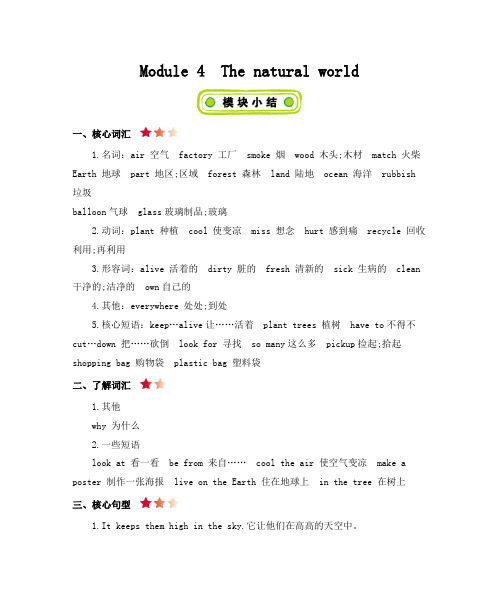
Module 4 The natural world一、核心词汇1.名词:air 空气factory 工厂smoke 烟wood 木头;木材match 火柴Earth 地球part 地区;区域forest 森林land 陆地ocean 海洋rubbish 垃圾balloon气球glass玻璃制品;玻璃2.动词:plant 种植cool 使变凉miss 想念hurt 感到痛recycle 回收利用;再利用3.形容词:alive 活着的dirty 脏的fresh 清新的sick 生病的clean 干净的;洁净的own自己的4.其他:everywhere 处处;到处5.核心短语:keep…alive让……活着plant trees 植树have to不得不cut…down 把……砍倒look for 寻找so many这么多pickup捡起;拾起shopping bag 购物袋plastic bag 塑料袋二、了解词汇1.其他why 为什么2.一些短语look at 看一看be from 来自……cool the air 使空气变凉make a poster 制作一张海报live on the Earth 住在地球上in the tree 在树上三、核心句型1.It keeps them high in the sky.它让他们在高高的天空中。
解读:此句型是表达使某人/某物保持一种状态的句型,这个句型是一个一般现在时的陈述句,主语是第三人称单数it, 所以谓语动词keep 要用其第三人称单数形式keeps。
keep是“维持,保持”的意思,后面接人称代词时要用其宾格形式。
举一反三: He would keep in touch with us wherever he was.他无论在什么地方,他总是与我们保持联系。
Will you keep us the seats?你给我们保留些座位,好吗?It keeps me sticking into my heart. 它使我的心不能忘却!2.We get wood from trees. 我们从树上获得木头。
牛津沪教版六年级上6A-Unit 1 知识点梳理 + 拓展阅读

6A Module 1 Family and friendsUnit 1 Family and relatives知识点梳理I. Useful words and expressions1. family与relativesfamily通常指自己的父母、兄弟姐妹等成员。
Relatives指的是除此之外与自己有血缘关系或非血缘关系的亲属。
2. 中英家庭称谓区别grandfather: 祖父,外祖父;grandmother: 祖母,外祖母;uncle: 叔父,舅舅,姨夫,姑父;aunt: 姑姑,姨母,婶婶,舅母;cousin: 堂兄弟姐妹,表兄弟姐妹;3. Alice has got a lot of presents and birthday cards from her family and relatives.a lot of 许多大量,后面加可数名词复数或不可数名词,相当于lots of。
get sth. from sb.: 从某人那里得到某物。
4. These are my uncles and this is my aunt.在介绍人物时,常用this is或these are这种句型,而不用使用he/she is, they are句型。
5. – Alice, what do you do with your aunt? – I usually go shopping with my aunt.问句中出现的第一个do是助动词,用于对实意动词的一般疑问句提问,其否定句形式是don’t。
同样作用的助动词还有does和did。
go shopping 去购物。
动词go后面跟动词时,常常接动词的-ing形式。
e.g., go swimming去游泳go cycling去骑车go fishing去钓鱼go camping去野营6. I always play football with my father.动词play后直接跟球类运动时,不需要加定冠词the。
六年级英语上册(牛津上海版) Unit6 going to school 知识点总结

沪教(一起)6A Unit 6 Going to school 知识点总结1.traveling time to school 去学校行走时间2.it takes sb. some time to do sth. 某人花一段时间做某事3.It takes him about ten minutes. 他花大约十分钟。
4.half an hour 半小时5.go to sp. by ferry 乘渡船去某地6.go to school on foot=walk to school 步行去学校7.how long 多久8.get to sp. 到达某地9.get to the supermarket 到达超市10.g et there/here/home 到达那儿/这儿/家里11.a restaurant 一个饭店12.a hotel 一个旅馆13.a n advertisement board 一块广告牌14.a few + c.n. 几个;一些(后跟可数名词复数)15.a lot of + c.n. & u.n. 许多(后跟可数名词复数或不可数名词)16.o n one’s way to school 在某人去某地的路上17.o n my way to school 在我去学校的路上18.b y light rail 乘轻轨19.d epartment stores 百货商店20.g o to kindergarten 上幼儿园语言点1. near 离…很近后面直接接地点I live near school.=My home is near school.我家离学校很近。
2. far away from=far from离…很远He lives far away from school.=His home is far from school.他家离学校很远3.by bus/bike/car/underground/train/ferry动词短语:take a bus/bike/car/underground/train/ferry ride a bikeHe goes to school by bus.=He takes a bus to school.4. on foot 动词:walkShe goes to work on foot every day.=She walks to work every day.5. It takes sb. some time to do sth. 花费某人多少时间做某事。
沪教版牛津英语六(上)语法点
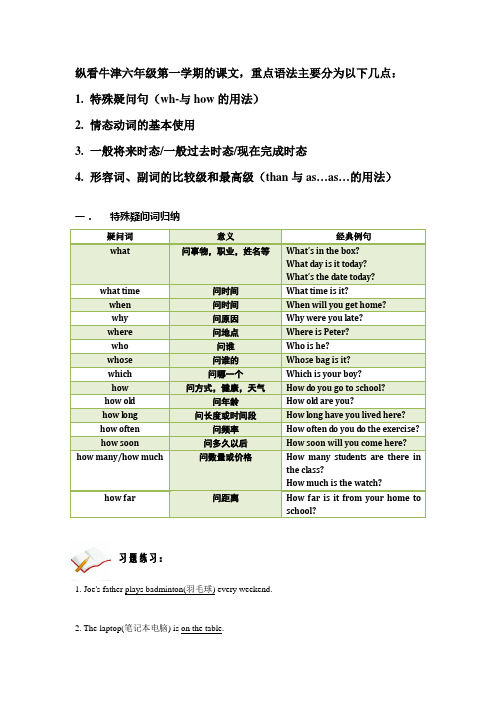
纵看牛津六年级第一学期的课文,重点语法主要分为以下几点:1.特殊疑问句(wh-与how的用法)2.情态动词的基本使用3.一般将来时态/一般过去时态/现在完成时态4.形容词、副词的比较级和最高级(than与as…as…的用法)一.特殊疑问词归纳疑问词意义经典例句what 问事物,职业,姓名等What’s in the box?What day is it today?What’s the date today?what time 问时间What time is it?when 问时间When will you get home?why 问原因Why were you late?where 问地点Where is Peter?who 问谁Who is he?whose 问谁的Whose bag is it?which 问哪一个Which is your boy?how 问方式,健康,天气How do you go to school?how ol d 问年龄How ol d are you?how long 问长度或时间段How long have you lived here?how often 问频率How often do you d o the exercise?how soon 问多久以后How soon will you come here? how many/how much 问数量或价格How many stud ents are there inthe class?How much is the watch?how far 问距离How far is it from your home toschool?习题练习:1. Joe's father plays badminton(羽毛球) every weekend.2. The laptop(笔记本电脑) is on the table.3. My mother is a nurse in the hospital.4. He gets up at 6:30 in the morning.5. Li Lei goes to work on foot.6. It is about 20 kilometers from my home to the town.7. I have lived in Hang Zhou for 20 years.8. I’m looking for my watch.9. The train will start in three minutes.10. Alice has the violin lesson twice a week.11. The building with green wall is the post office.12. He didn’t come because he was ill.注意事项:由于特殊疑问词孩子们从小学就已经开始接触,对于最基本的what/how/where等并不感到陌生,出题的难度一般也不会很大。
沪版牛津英语六年级上知识点归纳总结
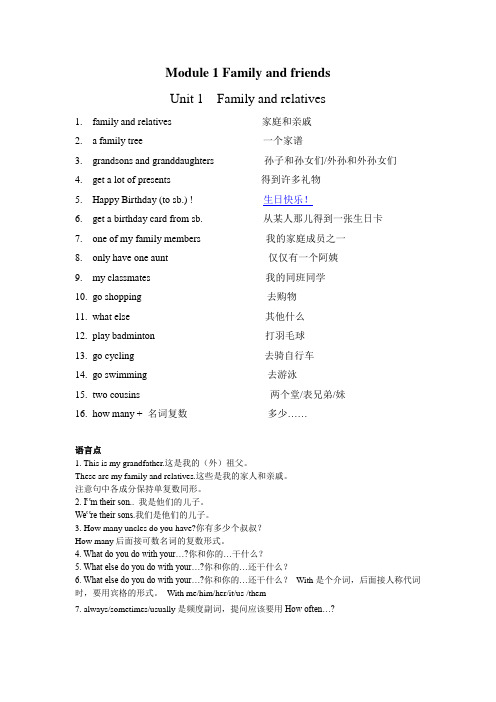
Module 1 Family and friendsUnit 1 Family and relatives1.family and relatives 家庭和亲戚2. a family tree 一个家谱3.grandsons and granddaughters 孙子和孙女们/外孙和外孙女们4.get a lot of presents 得到许多礼物5.Happy Birthday (to sb.) ! 生日快乐!6.get a birthday card from sb. 从某人那儿得到一张生日卡7.one of my family members 我的家庭成员之一8.only have one aunt 仅仅有一个阿姨9.my classmates 我的同班同学10.go shopping 去购物11.what else 其他什么12.play badminton 打羽毛球13.go cycling 去骑自行车14.go swimming 去游泳15.two cousins 两个堂/表兄弟/妹16.how many + 名词复数多少……语言点1. This is my grandfather.这是我的(外)祖父。
These are my family and relatives.这些是我的家人和亲戚。
注意句中各成分保持单复数同形。
2. I‟m their son.. 我是他们的儿子。
We‟re their sons.我们是他们的儿子。
3. How many uncles do you have?你有多少个叔叔?How many后面接可数名词的复数形式。
4. What do you do with your…?你和你的…干什么?5. What else do you do with your…?你和你的…还干什么?6. What else do you do with your…?你和你的…还干什么?With是个介词,后面接人称代词时,要用宾格的形式。
牛津上海版英语六年级上册Unit6知识点及语法点
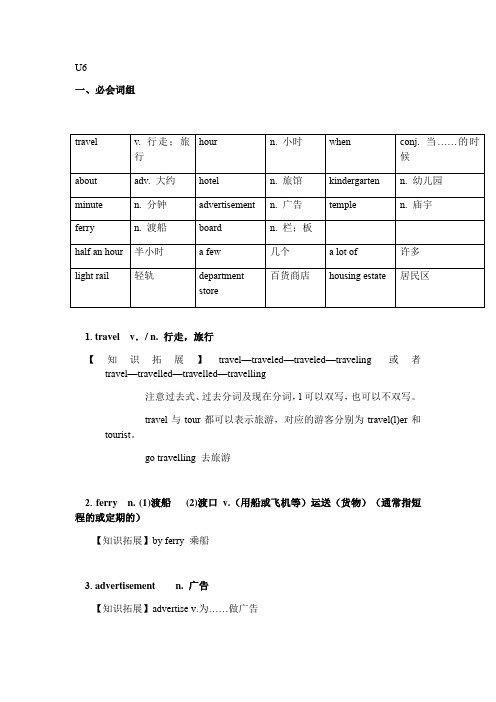
U6一、必会词组1. travel v./ n. 行走,旅行【知识拓展】travel—traveled—traveled—traveling或者travel—travelled—travelled—travelling注意过去式、过去分词及现在分词,l可以双写,也可以不双写。
travel与tour都可以表示旅游,对应的游客分别为travel(l)er和tourist。
go travelling 去旅游2. ferry n. (1)渡船(2)渡口v.(用船或飞机等)运送(货物)(通常指短程的或定期的)【知识拓展】by ferry 乘船3. advertisement n. 广告【知识拓展】advertise v.为……做广告4. board n. 栏;板【知识拓展】abroad adv. 在国外,到国外。
broad adj. 宽广的。
形象记忆board这个单词:首尾bd两个字母想象成船头和船尾,中间oar是一个单词,意思是“桨”,所以board有“甲板,上船”的意思。
5. a few 几个。
a few只能修饰可数名词复数形式,与之对应的是a little, 只能修饰不可数名词。
练习:I.Read and complete the sentences.(根据给出的首字母,完成句子。
)1. I have been to Jing’an T .It's in the centre of Shanghai.2. My father’s office is far away from home. He goes to work by l r every morning because it is fast.3. Mum likes going to some department s at weekends.4. We live in a new h e . It's large and beautiful.keys: 1.Temple 2.1ight rail 3.stores 4.housing estate 【乘坐交通方式表达】乘坐交通工具的表达:by bus/by car/by underground/by bike/by plane/by ferry /on foot乘公共汽车/乘小汽车/乘地铁/骑自行车/乘飞机/乘轮渡/步行。
沪教牛津版六年级知识点归纳

六上Module 1-Getting to know each other教学目的:1.学会在详细语境中运用新单词。
2驾驭某些动词过去式的用法。
3.学会用过去时态表述状态。
4.学会用过去时态表述做的事。
5.驾驭写信的格式。
6.稳固情态动词 can、should用法。
重点词汇: ① mouth cute pretty handsome catch② famous during spend everyone countryside③ healthy unhealthy Hamburgyesterday sandwich vegetablechicken chocolate重点句型:1. I/He/She was...You/We/ They were...2.-How was your summer holiday?-It was/was not ...3.- What did you have for breakfast/ lunch/ dinneryesterday?- I had some...语音发音:e e-e ee ea i y e a eaP b t d k c ck gModule 2-Relationship教学目的:1.学会在详细语境中运用新单词。
2驾驭某些动词过去式的用法。
3.学会用一般过去时的疑问句。
4.稳固wh - questions 在过去语态中的用法。
5.驾驭数词 hundred,thousand的用法。
6.稳固 Would like to...句型和 There be ...句型。
重点词汇: ① neighbour son daughter noisy dig② thousand hundred wild way die learn send③ e-friend country other hobby重点句型:1. - Did you +动词原形+过去时间?- Yes,I did./ No,I didn’t.2.There was a...in the past.There were many...in the past.3.-Would you like to ...-Yes,I’d like to./No, I wouldn’t.语音发音 a ar u o ue u-e oo uf v thModule 3-Out and about教学目的:1.学会在详细语境中运用新单词。
- 1、下载文档前请自行甄别文档内容的完整性,平台不提供额外的编辑、内容补充、找答案等附加服务。
- 2、"仅部分预览"的文档,不可在线预览部分如存在完整性等问题,可反馈申请退款(可完整预览的文档不适用该条件!)。
- 3、如文档侵犯您的权益,请联系客服反馈,我们会尽快为您处理(人工客服工作时间:9:00-18:30)。
沪教牛津版六年级英语上册全册知识点汇总Module 1 Getting to know each other一、核心词汇1.表示时间名词:month 一个月的时间;月份yesterday 昨天2.形容词:cute 可爱的pretty 漂亮的handsome 英俊的;帅气的famous 著名的;出名的healthy 健康的;有益于健康的unhealthy 不健康的;损害健康的3.动词:catch 逮住;捕捉spend 度过pick 采摘4.食物名词:hamburger 汉堡包fruit 水果pie 馅饼pizza 比萨饼cola可乐sandwich三明治vegetable 蔬菜chicken 鸡肉chocolate 巧克力5.表示动物名词:turtle 乌龟fly 苍蝇6.其他:during 在……期间everyone 每个人;所有人countryside 乡村;农村7.核心词组:grow up长大;成长junior high school 初级中学(be)born 出生summer holiday 暑假the Great Wall 长城the Palace Museum 故宫博物院Tian’an men Square 天安门广场go swimming 去游泳go to the museum 去博物馆go to the cinema 去电影院junior high school 初级中学do my homework 做我的家庭作业watch TV看电视visit my friends 拜访我的朋友 a little 少量的fish and chips 炸鱼薯条二、了解词汇1.一些动词及过去式:go(去)—went do(做)—didhave/has(有)—had watch(观看)—watchedvisit(访问;探望)—visited am/is(是)—was are(是)—were2.一些食物名词:egg 鸡蛋bread 面包noodles 面条dumplings 饺子3.其他:menu菜单三、核心句型1.Her hair was short and her eyes were big. 她那时头发很短而且眼睛很大。
解读:这个句子是描写过去某段时间的人物特征,因此系动词要用它的过去式。
当主语是第三人称单数时,系动词要用is的过去式was;反之就用are的过去式were,后面直接跟描写人物外貌特征的形容词。
举一反三:My hair was short then. 我的头发那时很短。
My hands were small then. 我的手那时很小。
My sister was short then. 我的妹妹那时很矮。
2.Justin was born in the river. 小贾斯汀在河里出生。
解读:这个句子是描写某人出生在某地的句子,因为每个人的出生都是过去的事情,因此系动词要用它的过去式。
当主语是第三人称单数时系动词要用is 的过去式was;反之就用are的过去式were,后面直接跟出生的地点。
如果需要说明出生年、月、日的时候,就用介词on后跟月份加日期的基数词最后写年份。
举一反三:I was born in Zhanjiang. 我出生在湛江。
My father was born in Beijing on Nov.4,1978.我的爸爸于1978年11月4日出生在北京。
3.— How was your summer holiday?你的暑假过得怎么样?— It was wonderful.它很精彩。
解读:这个句子是询问过去过得怎么样的句型及回答,因为是询问过去的事情,因此系动词要用它的过去式。
how意为“怎样;如何”。
was是is/am的过去式。
答语中的系动词也要使用过去式。
举一反三:— How was your birthday?你的生日过得怎么样?— It was beautiful. 太精彩了。
— How was your weekend?你的周末过得怎么样?— It was nice. 很好。
4.We went to the Great Wall. 我们去了长城。
解读:这个句子是描写某人过去去过某地的句型。
因为是描写过去的事情,因此动词要用它的过去式,went 是go 的过去式。
举一反三:My father went to the zoo last Sunday. 上周日我的爸爸去了动物园。
My sister went to Hainan with my uncle.我的妹妹跟我的叔叔去了海南。
5.Everyone had a good time. 大家玩得都很开心。
解读:这个句子是描写过去每个人玩得很愉快的句型,因此动词要用过去式。
此处had是has的过去式。
everyone作主语时,与单数谓语动词连用。
举一反三:Everyone works very seriously. 每个人工作都很认真。
My sister had a good time. 我的妹妹玩得很高兴。
6.— What did you have for breakfast this morning?你今天早上早餐吃的什么?— I had some bread and milk. 我吃了一些面包和牛奶。
解读:这个句子是询问对方过去一日三餐吃了什么的句型及回答,因为是询问过去的事情,因此助动词do要用它的过去式did,没有人称和数的变化。
what 意为“什么”。
答语中的系动词也要使用过去式。
问句中三餐用介词for来连接,意为“当成;作为”。
举一反三:— What did your father have for lunch?你爸爸午餐吃了什么?— He had some chicken and vegetables.他吃了一些鸡肉和蔬菜。
— What did you have for dinner?你晚餐吃了什么?— I had some noodles. 我吃了一些面条。
四、了解句型1.Ben was about six months old.本那时大约六个月大。
解读:这是一个描写某人过去大约年龄的句子。
2.That’s not healthy. 那是不健康的。
解读:这是一个描写某物是不健康的句型。
3.I didn’t have breakfast this morning.我今天早上没有吃早餐。
解读:这是一个描写某人在某段时间没有吃三餐的句型。
Module 2 Relationships一、核心词汇1.家庭成员:son 儿子daughter 女儿2.动物类:owl 猫头鹰rhino 犀牛3.数词:thousand 一千hundred 一百4.形容词:noisy 吵闹的other 其他的wild 野生的5.动词:dig 挖(土);掘(洞) die 死;死亡learn 学习send 安排去;寄;送6.名词:neighbour 邻居country 国家hobby 爱好e-friend 网友wild野生环境7.代词:yourself 你自己8.其他:team(游戏或动作的)队grade 年级9.词组:make noise 制造噪音take care of照顾;照料go for a walk 去散步Drive away 赶走in danger 面临危险in the past 在过去South China tiger 华南虎Blue whale 蓝鲸would like(表示愿意、喜欢)二、了解词汇1.动词词组:be from 来自play chess 下国际象棋play table tennis 打乒乓球play with 和……一起玩talk about 谈论have an idea 有一个主意dig a hole挖了一个洞have a good sleep 睡得很好go out 出去Have fun 玩得开心2.介词词组:in the morning 在早上in the forest 在森林里under the tree 在树下in holes 在洞里at night 在晚上in the wild 在野生环境里in the blue sky 在蓝天中under the sea 在海底in different countries在不同的国家3.其他:last weekend 上周末every night 每晚 a lot of 很多三、核心句型1.— Did you play with Sam last weekend?上周末你和萨姆一起玩了吗?— Yes, I did. 是的,我和萨姆一起玩了。
解读:这个句子是询问某人过去是否做过某事的一般疑问句及回答。
此问句是由助动词do引导的一般疑问句的过去式的形式,因此助动词do要用它的过去式did,在句中没有实际意义,引导一般疑问句时要放到句首,没有人称和数的变化。
也就是说无论主语是什么,did后面出现的动词一律用动词原形。
举一反三:— Did you go to school yesterday? 昨天你去上学了吗?— Yes, I did. 是的,我去上学了。
— Did you have a good day today?你今天过得好吗?— No, I didn’t. 不,我过得不好。
— Did you have fun?你玩得开心吗?— Yes, I did. 是的,我很开心。
2.In the past, there were many pandas. 在过去,有很多熊猫。
解读:这个句子是描述过去存在某些事物的句型,were 是are 的过去式。
举一反三: In the past, there were twelve of us in all for dinner.在过去,我们一共有十二个人吃晚餐。
In the past, there were no printed books.在过去,没有印刷的书籍。
In the past, there were piles of litter in the street.在过去,街道上垃圾成堆。
3.— Would you like to have e-friend in other countries?你想有其他国家的网友吗?— Yes, I’d like to have an e-friend in the US.是的,我想找一个美国的网友。
解读:这个句子是询问某人是否想做某事的句型及回答。
would like是固定短语,意为“想;想要”。
这是一个一般疑问句,would放到了主语的前面。
举一反三:— Would you like some tomato juice?你想要些番茄汁吗?— Yes, please. 是的,我想要。
